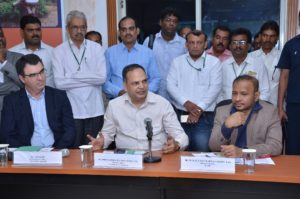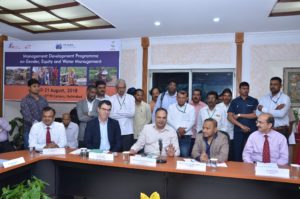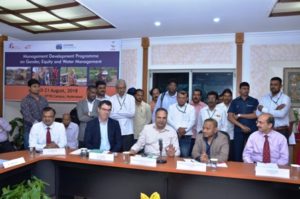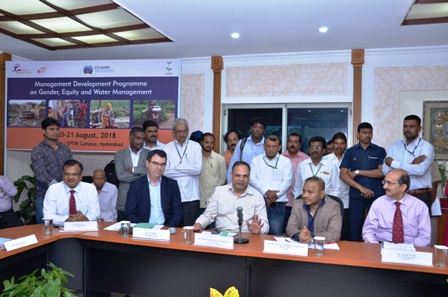Hyderabad: A two-day Management Development Programme on Gender Equity and Water Management aimed at building the capacity of Engineers in the Department of Irrigation and CAD to chalk out future directions in understanding and analysis of water inequalities specifically incorporating the gender component and the role of women was inaugurated today by Shailendra Kumar Joshi, Chief Secretary, Government of Telangana. Present on the occasion were Sh. B Kalyan Chakravarthy, Director General EPTRI;Ian Reid, Chief Academic Officer, ICE WaRM, Australia; Dr Rajiv Seth, Pro-VC TERI SAS and Dr Arun Kansal, Dean &Head of Department of Regional Water Studies at TERI SAS.
The Water Management in the state of Telangana that is primarily an agrarian state has seen many policy changes over the years that have been directed to change the farm economy by reducing cost of cultivation and increasing productivity. Mission Kakatiya, the flagship program of government of Telangana, a state whose formation itself was catalyzed by perceived regional injustices in water distribution for irrigation, was launched in 2014. The mission aims to harness benefits of tank irrigation by increasing command area, water supply for irrigation and opportunities for agriculture. However, the national or state water policies over the years have not accorded any importance to gender concerns and implementing future direction in the understanding and analysis of water inequalities which explicitly recognizes the central role of women in the provision, management and safeguarding of water.
In his inaugural address Shailendra Kumar Joshi, Chief Secretary, Government of Telangana reiterated the need for constant capacity development amongst officials towards water management practices especially with respect to gender equity, women’s empowerment and women’s rights in water management. In the inaugural address, he said that, “The water scarcity problem in India is not due to non-availability of water. The issue is about how to harness it for equitable distribution. Even though Telangana is located in between two rivers Godavari and Krishna, the state has struggled for water for the last 70 years. There are two major initiatives by the government of Telangana, namely the Mission Kakatiya and Mission Bhagiratha for irrigation water management and water provisioning to households respectively. This would help in achieving equity not just gender but across caste, class and socio-economic groups.”
In his address Dr Rajiv Seth, Pro Vice Chancellor of the TERI School of Advanced Studies, that will soon assume its operations and campus in the state of Telangana in 2019 said, “Gender mainstreaming has been part of the international discourse on Integrated Water Resource Management for many years. There have been several efforts and initiatives in making the water sector more gender balanced and gender sensitive. However, critical challenges remain to be addressed. This two-day MDP course that officials of the state are undergoing shows the commitment that the state recognizes the prospects for effective gender mainstreaming in water management and the state’s keenness to address the transformation of gender relations and treat water as a human right issue so as to realize the Sustainable Development Goals (SDGs) in a country like ours.”
Stressing upon the two flagship missions – Mission Kakatiya and Mission Bhagiratha, the Director General EPTRI Sh. B Kalyan Chakravarthy IAS brought out the need for devising new models and solutions for addressing water issues which are interdisciplinary in nature. To achieve equity, the approach must be all inclusive taking into consideration people across different socio-economic strata.
The Highlighting the need for gender equity in water management, Ian Reid, Chief Academic Officer, ICE WaRM, Australia emphasized the requirement for gender mainstreaming and mentioned that by not engaging with women, we don’t use all the resources we have.
The Management Development Program (MDP) on Gender Equity and Water Management is a first-of-its-kind curriculum with the purpose of making gender and gender mainstreaming relevant to the professionals and managers working in the water sector. The programme develops a superior conceptual and theoretical understanding of gender, rights and equity issues among participants while providing them with exposure to the practical challenges in making the water sector more gender balanced and gender sensitive. The program also aims to build capacities of participants with respect to gender equity by suggesting practical strategies to enable them to work for sustainable and gender sensitive management of water resources. The overall objective is to make the participants better informed and motivated to make changes within their overall sphere of influence as well as to emerge as stronger advocates for gender equity at a personal level. The programme comprises two days of interactive sessions. The pedagogy comprises lectures by renowned experts, academicians and researchers, case studies, short films, and group work to facilitate cross-learning and synthesis.
The two-day management development course will delve on topics that that will help officials in understanding of gender to policy and planning. These include — Institutions, Gender and Equity: understanding the relationships in water access, water access in peri-urban Hyderabad, issues and experiences in approaches to mainstreaming gender sector, loss of the lakes of Hyderabad: causes and equity implications, understanding legal pluralism in water access.





















